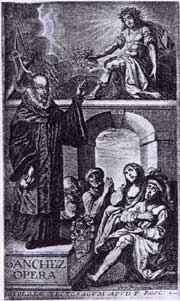|
Francisco Sanches (1550 or 1551-1623)
Born within the diocese of Braga, he studied in Portugal until the age of 12, having then moved on to Bordeaux to continue his studies at the Colégio de Guyenne, where he studied until 1569. This college was the seat of intellectual renovation where religious reformism and the Italian renaissance had an important influence. In 1569, at the age of 19, Sanches went on to Italy, where he studied medicine and learnt how to investigate corpses. When he returned to France, he enrolled at the Faculty of Medicine of Montpellier, the city which was the centre of medical studies at the time. Two years later, in 1575, he set up residence in Toulouse, where he lived until his death. As from 1581, he took up office as a medical doctor at the Hospital Saint Jacques in Toulouse, a post which he maintained for 39 years. In 1585, he was invited to become professor of the Faculty of Arts of Toulouse, where he taught for 25 years. In 1610, he entered the Faculty of Medicine, where he remained for 11 years.
Philosophy and Science
According to Moreira de Sá, “Francisco Sanches, astronomer, versed in geometry, philosopher and medical doctor, untiring observer of Nature, authentic prototype of the men of the Renaissance, left us with a work that was the forerunner of the philosophical revolution of the seventeenth and eighteenth centuries”.
 |
|
|
|
|
(click on the picture above to see an enlarged version)
Frontispiece of the Opera Medica by Francisco Sanches
|
|
|
|
Francisco Sanches, referred to as a sceptical philosopher, explored the epistemological situation of man and tried to show that the claims of the knowledge of man in all areas of knowledge raised many doubts. The philosophical attitude of Sanches was developed throughout the seventeenth century by other philosophers who, using his scepticism as a basis, evolved to an upgrading of scientific knowledge from a hypothetical and empirical interpretation. His manner of thinking is very often presented as the forerunner of Cartesian gnosiological criticism and of Bacon’s experimentalism. In his first work, Quod nihil scitur (That nothing is known), he reveals himself to be contrary to the pretensions of an established science and an adversary of scientific and philosophical dogmatism. Although always acknowledging the presence of a supreme architect as the origin of all the universe, Sanches gave great importance to the experimental plane, considering the universe to be a system of laws, excluding all the forms of knowledge and language that imply a deviation in meaning. He also expressed his dissatisfaction in relation to metaphysics and pseudo-science.
While he was in Italy, he specialised himself in anatomical and surgical studies, influenced by the works of Realdo Colombo (1516?-155 9) and Vesálio (1514-1564). His activity as a medical doctor gave rise to the publication of the work Opera Medica by his children and Delassus. According to Joaquim de Carvalho, “He did not draw his knowledge from books, but rather from his own experience and made his mission a theory of science and an explicative theory of nature with the type of knowledge that a doctor applies”.
For a better understanding of the philosophical and scientific thinking of Francisco Sanches, read the text Pedro Calafate on Portuguese Philosophy, at the Centro Virtual Camões. See also the text by Onésimo Teotónio de Almeida, in Episodes – “Francisco Sanches – O Elo perdido entre os descobrimentos e a ciência moderna.”
Publications
Carmen de Cometa, 1577.
Quod nihil scitur, 1581.
De divinatione per somnum, ad Aristotelem, 1585.
Opera Medica, 1636, which includes severa philosophical treaties: 1) De Longitudine et Brevitate vitae, liber; 2) In lib. Aristotelis Physiognomicon, Commentarius; 3) De Divinatione per Somnum; Quod Nihil Scitur, liber.
Tractatus Philosophici, 1649.
Ad C. Clavium epistola, a letter addressed to Christopher Clávio, 1940.
Fernando Reis
Bibliography
SÁ, Artur Moreira de, Francisco Sanches, Filósofo e Matemático, Lisboa, 1947, 2 vols.
SÁ, Artur Moreira de, Francisco Sanches, Lisboa, SNI, 1948. [Antologia com Prefácio e Selecção de]
PINTO, Sérgio da Silva, Francisco Sanches, vida e obra, Braga 1952, sep. de Bracara Augusta, vol. III, N.º 3-4.
CARVALHO, Joaquim de, Opera Philosophica, Coimbra, Universidade, 1955.
Hyperlinks
Filosofia Portuguesa – Francisco Sanches
|
|

